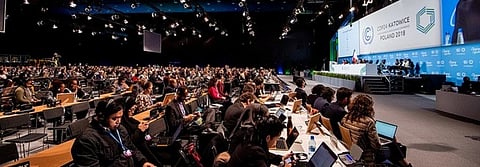COP24: Developed nations successfully wipe out equity in finance, reporting
In the last leg of the 24th Conference of Parties (COP 24) to the United Nations Framework Convention on Climate Change (UNFCCC) at Katowice, Poland, here at Katowice, as negotiations continue to happen in non-transparent and non-inclusive manner, it is becoming increasingly clear that developed countries are working towards a weak and non-ambitious Paris rulebook. Also, they have been able to form successful coalitions with China and island states to push for their agenda.
COP24 President Michal Kurtyka announced new texts proposals with regard to various agenda item. Even though there is massive push by the civil society to raise ambition, also with reference to Talanoa Dialogue, and recognise science as a crucial catalyst in deciding ambition, there is no mention of it in the decision texts till now.
A High Ambition Coalition is re-established on the lines of the Paris Agreement by the European Union and other states but it seems unlikely that it would be able to push ambition in the final COP24 outcomes. For pre-2020, in the current texts, the developed countries are merely encouraged to step up their pre-2020 ambition.
Developing countries have also lost the fight when it comes to equity in ex-ante provision and review of finance by developed countries. Now, developed countries will only communicate indicative financial provisions without subjecting it to the adequacy. The text is also silent on new financial goal post 2020 and recognises that more discussions need to happen on this front.
Loss and damage has been the weakest element so far and clearly implies that developed countries have turned a blind eye to the most existential impacts of climate change on poor and vulnerable countries despite a significant push by the island states to recognise and give due spaces in the Paris rulebook. It is absent in provision and accounting of finance and is referred as a footnote in Global Stocktake under its overarching elements and as an option under sources of input.
In a major loss for countries like India, which have been pushing for “flexibility for all” reporting for all developing countries, US, EU and China have succeeded in blurring equity with flexibility now only for least developed countries and island states.
Developing countries have lost the fight for “flexibility to all” under reporting and the text is now on differentiation within developing countries, a clear victory for the US and the EU and China. It is still a long way to go to determine the finer details of the elements. Parties could not agree on indicators or metrics to track progress on climate action and support and as such the current text says that these would be self-determined. Much of the reporting issue on common timeframes, baselines etc would be discussed later.
Equity is referred several times in Global Stocktake for assessing collective process but operationalisation is still contested and would be decided later. The role of non-party stakeholders is not inclusive and the language is fuzzy.
Most of the elements under markets and non-market mechanisms remain to be fleshed out owing to the greater complexities and stark differences in stances on issues. As of now, the text refers to value of single tradeable unit in CO2 equivalent. It has no safeguards or limits on trading, leaving this up to future COP decisions. It also does not mandate that a portion of the units generated by a country should not be traded, which was proposed by some negotiators.
These measures would have contributed to more stable and sustainable emissions reduction markets. There is no clear indication of “environmental additionality” and on “corresponding adjustments”. It is also not clear whether and how would the Clean Development Mechanism (CDM) in Kyoto regime’s transition be integrated into the new regime. As of now, options exist for and against it.
How developing countries are going to react to the texts remains to be seen. As the COP24 is coming to the close, can developing countries unite and pose collective front to fight for the issues that matter to them? Can they push for higher collective ambition and due recognition to science? A Paris rulebook which is not balanced and is weak would not meet the climate goals, in any case.


